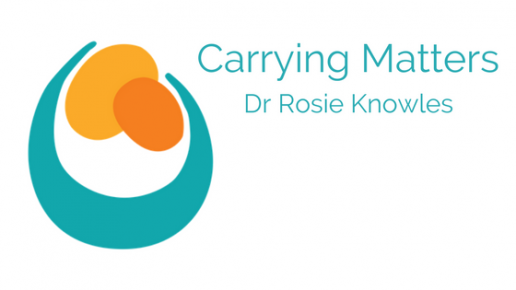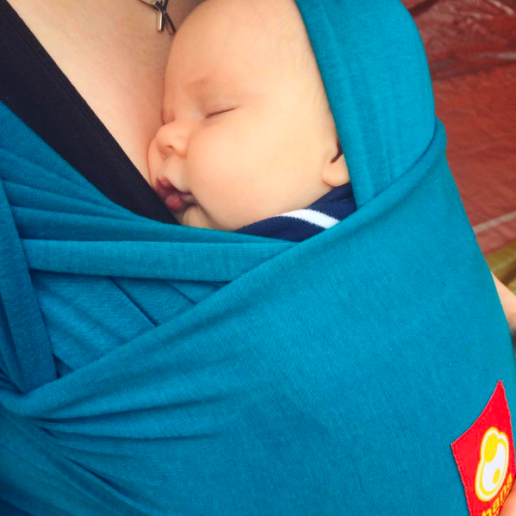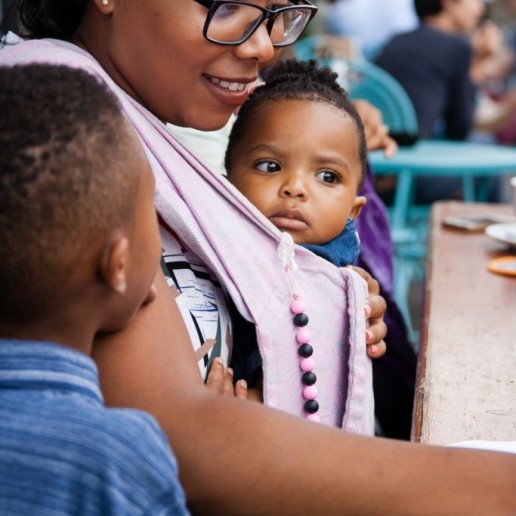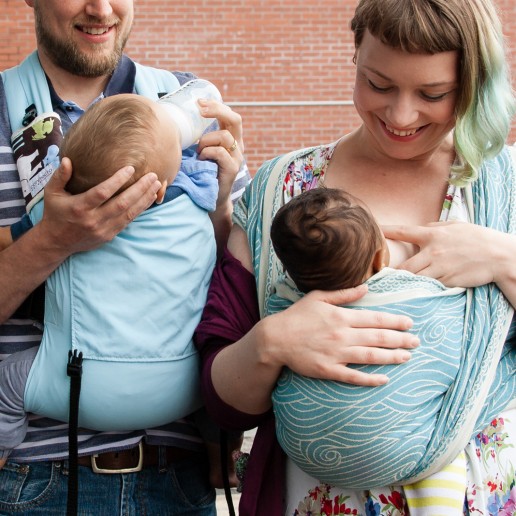Why does carrying matter? There are so many reasons why holding and carrying children matters, on multiple levels (biological, developmental, psychological, sociological, long term health) that it would take a whole book to discuss, even in brief!
Carrying behaviour is normal for the human species; babies are very vulnerable at birth. They are born with great needs, there are many months and even years of maturation needed before human infants are able to control their bodies fully and become able to care for themselves independently. Babies and young children are dependent on their primary caregivers for a very long time. This prolonged childhood is thought to be one of the reasons why the human species has been so successful; allowing the human brain to develop complex skills such as language, creativity and the ability to alter the environment around them.
Mothers’ and babies’ bodies are adapted to each other; during pregnancy, during birth, and during the early years. They “fit together” and create a very special shared space, honed over the millennia of evolutionary processes. They work perfectly in harmony, when given the support and freedom to do so.
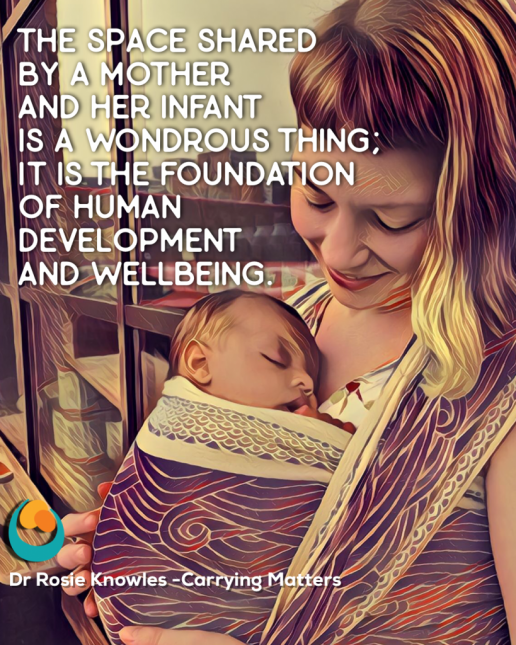
This is where the “4th Trimester” concept comes from; holding and carrying babies recreates in some part the intra-uterine environment of warmth and safety and containment and allows them to develop new skills from this platform of security. Our human instincts are strong (a baby’s cry tugs at our heartstrings and we feel the urge to gather them up, hold them close and rock gently while murmuring in a soothing way) and we are discovering much of the neurochemical science behind this normal, natural behaviour. Oxytocin release builds loving connection via multiple pathways. Soft touch has helpful effects on the hypothalamic-pituitary-axis and cortisol production, reducing pain and modulating the stress response. Gentle and responsive parenting builds and reinforces the neural circuitry as it develops in the child, creating a healthy positive inner thought state that affects long term mental health. Furthermore, building this resilience helps to combat the adversity that so many children experience. Early “skin to skin” contact is enormously useful for beginning this process of connection.
Children need loving nurture in the early neonatal period and long beyond this for normal, healthy development. Carrying babies close to an adult’s body, as human beings have evolved to do, is vital for normal physiological and psychological development. Research into the importance of skin to skin contact, soft touch and responsive parenting, as well as a better understanding of disability reinforces this.
I talk about the positive effects of holding, carrying and babywearing, rather than the “benefits” of these practices. The word “benefit” implies an extra thing, an advantage, something that can be added onto what is baseline… but the holding and carrying (however it is done, in arms or a sling) that builds connection is part of normal human development. It is the baseline! It isn’t something that some parents can choose to do to give their child an extra advantage in life. It is what all babies need, like nourishment, warmth, safety. The absence of these loving connections that involve gentle physical touch is harmful to children.
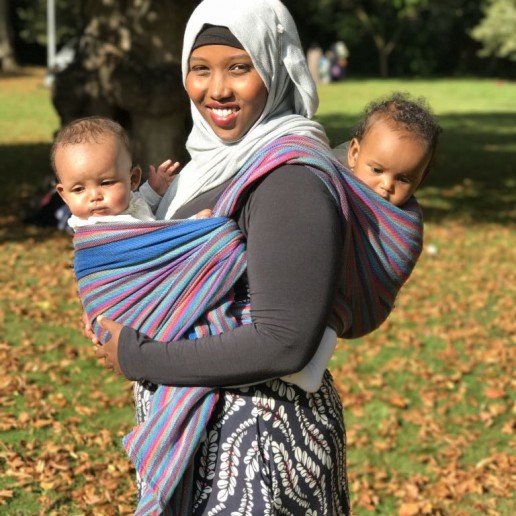
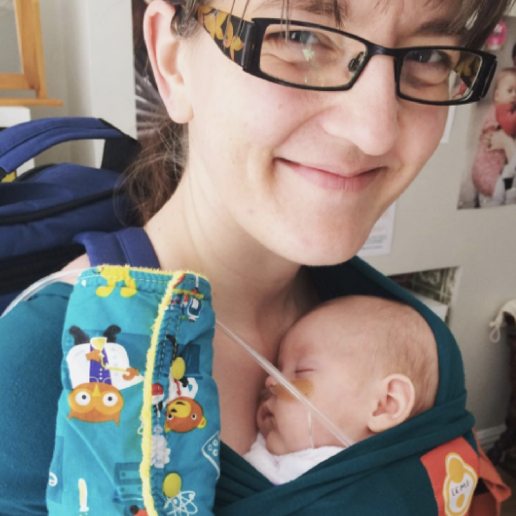
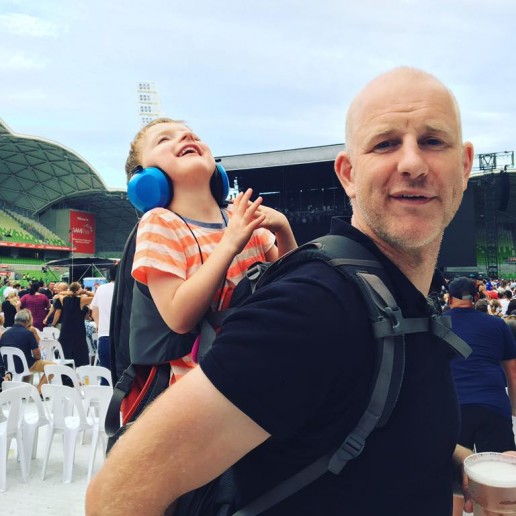
We can agree that carrying children matters. However it is not just babies and children who need the close contact; parents and caregivers also benefit hugely from holding their offspring and interacting with them closely. The same biochemical pathways that help babies and young children to thrive are present in adults too, and families flourish when the needs of all its members are met. Adults need loving contact too; and a child who calms when comforted in arms or a sling provides positive reinforcement that parenting is manageable after all. Many parents find that babywearing can help with low mood and improve their confidence, as well as giving them freedom to get on with their lives in the societal constraints in which they live.
Carrying in arms and in a sling really does make a significant difference to the overall wellbeing and physical and mental health of all members of society, both now and for the future. A society where children’s needs and rights are taken seriously, where knowledge of how to build securely attached children and adults is put into practice, and where the most vulnerable among us are treated with love and kindness, is one in which we would all wish to live. This is why carrying matters; it can change the world around us.
To find out more, please click the links below.

